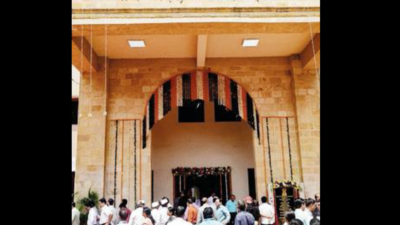Top Searches
- News
- City News
- nagpur News
- Need to reduce case pendency: Devendra Fadnavis
Need to reduce case pendency: Devendra Fadnavis

The new L-shaped building of the district and sessions court
Nagpur: Seven years after they performed the groundbreaking ceremony of the Lshaped building of the district and sessions court, Justice Bhushan Gavai, Union minister Nitin Gadkari and deputy chief minister Devendra Fadnavis inaugurated the inordinately delayed project on Sunday.
A plethora of dignitaries attended the inaugural function of the new building built at a cost of `160 crore, whose groundbreaking ceremony was performed by the trio on March 19, 2016. The list included Bombay High Court chief justice Sanjay Gangapurwala and other HC judges — Sunil Shukre, Atul Chandurkar, Anil Kilor and Valmiki Menezes.
Principal district and sessions judge SB Agrawal also shared the dais. Admitting that the government was the biggest litigant, Fadnavis stressed on the need to reduce pendency. “The judiciary should be strong in the state. It plays a big role in a nation’s development. We started commercial courts, which is the trend in the entire world. The investors all over the globe tend to invest at such places where there are courts that can dispose of disputes quickly. We have also started arbitration,” he said. Quoting Gangapurwala, the deputy CM called on the judges and lawyers not to adjourn the first case which would be heard in the new building.
“The efficiency of governance increases with the infrastructure. Before Covid struck, digitization was very less. The judiciary rose to the occasion during the pandemic and all stakeholders gave a good response to digitization. Even hearings were conducted online.” Taking a jibe at the opposition, Fadnavis said even the building wanted to get inaugurated at the hands of those who performed its Bhumipujan and therefore, in the last two and a half years, the event was delayed.
Stressing that justice should be delivered on time, Gadkari pointed out that those who receive their monthly salary, did not pay attention to this aspect. “The delays cost the government crores in compensation and rising infrastructural costs. Therefore, I always say that I like the people who can get things done, even if they are wrong. I dislike those who do not make decisions. We need to dwell on how much infrastructure needs to be created to reduce the pendency of cases.”
A plethora of dignitaries attended the inaugural function of the new building built at a cost of `160 crore, whose groundbreaking ceremony was performed by the trio on March 19, 2016. The list included Bombay High Court chief justice Sanjay Gangapurwala and other HC judges — Sunil Shukre, Atul Chandurkar, Anil Kilor and Valmiki Menezes.
Principal district and sessions judge SB Agrawal also shared the dais. Admitting that the government was the biggest litigant, Fadnavis stressed on the need to reduce pendency. “The judiciary should be strong in the state. It plays a big role in a nation’s development. We started commercial courts, which is the trend in the entire world. The investors all over the globe tend to invest at such places where there are courts that can dispose of disputes quickly. We have also started arbitration,” he said. Quoting Gangapurwala, the deputy CM called on the judges and lawyers not to adjourn the first case which would be heard in the new building.
“The efficiency of governance increases with the infrastructure. Before Covid struck, digitization was very less. The judiciary rose to the occasion during the pandemic and all stakeholders gave a good response to digitization. Even hearings were conducted online.” Taking a jibe at the opposition, Fadnavis said even the building wanted to get inaugurated at the hands of those who performed its Bhumipujan and therefore, in the last two and a half years, the event was delayed.
Stressing that justice should be delivered on time, Gadkari pointed out that those who receive their monthly salary, did not pay attention to this aspect. “The delays cost the government crores in compensation and rising infrastructural costs. Therefore, I always say that I like the people who can get things done, even if they are wrong. I dislike those who do not make decisions. We need to dwell on how much infrastructure needs to be created to reduce the pendency of cases.”
Start a Conversation
FOLLOW US ON SOCIAL MEDIA
FacebookTwitterInstagramKOO APPYOUTUBE









